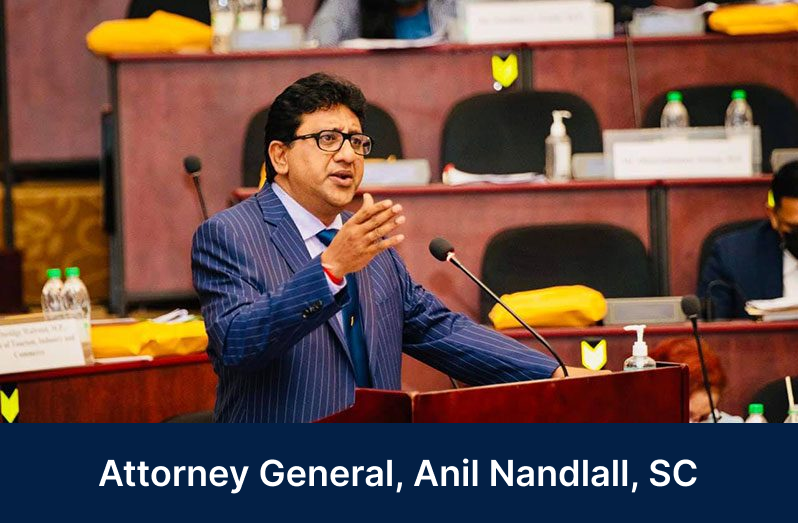
Since assuming office in August 2020, the Guyana Government has embarked on an aggressive programme for legislative and regulatory reform. This approach has produced a modernised Petroleum Activities Law which the nation’s Attorney General, Anil Nandlall, SC hails as “the most modern expression” of its kind within the western hemisphere.
During his first appearance on the Energy Perspectives podcast, a programme powered by the Guyana Energy Conference and Supply Chain Expo, the Minister of Legal Affairs detailed the comprehensive nature of the revamped framework to govern the oil and gas industry.
The Attorney General noted that the Petroleum Activities Law, enacted in August 2023, replaced the Petroleum (Exploration and Production) Act of 1986. Nandlall noted that the 1986 legislation was promulgated at a time when there was no evidence of petroleum products in commercial quantities. By sheer passage of time, that legislation was rendered archaic and ineffective to govern the 11 billion barrels of oil equivalent resources unlocked by an ExxonMobil-led consortium in the Stabroek block during the period 2015 to 2024.
Nandlall was keen to note that the new oil law was not drafted locally.
“…That is the important thing about our government, we know when we don’t know. We are courageous and intelligent enough to accept that…we engaged in drafting that bill through engagements with experts that looked at models in Europe, Canada, several states in the U.S.A, the Middle East, and we came up with that law,” said the Attorney General.
He added, “It is the most modern expression of the law in this hemisphere, and it caters for everything…”
The reformed legislative and regulatory framework for the oil sector also saw the introduction of the Local Content Law in December 2021.
“We recognised quickly that unless we protect local labour, it would be ousted from the sector completely…Why? The sector by itself has certain inherent, inalienable characteristics. The companies operating in the oil and gas sector, they move as a collective,” Nandlall said. In this regard, he noted that ExxonMobil moves with a well-developed ecosystem of service providers.
“Unless you have some way of carving a niche out for your people, then that entire sector would be dominated by that congregation that follows the major operators,” the Attorney General. It is with this understanding that the government moved quickly to introduce the law which calls for Guyanese to be given first preference across 40 categories of work.
To ensure the prudent spending and saving of the nation’s oil revenues, Nandlall said the PPP/C government introduced a Natural Resource Fund law in December 2021. This legislation, he said, ensures that all revenues are subjected to strict reporting guidelines to ensure transparency and accountability, from the point of receipt to the spending of every cent.
“The Ministry of Finance must disclose every deposit into the fund and seek parliamentary approval before spending. The Act also speaks to the use of the fund…the president and government can’t just go and decide they will buy 10 airplanes and two helicopters with the money. It can only be used for transformational national projects,” said the Attorney General.
He stressed that any violation of the law carries heavy penalties, humongous fines, and jail sentences.
With Guyana now host to over US$55 billion in offshore developments, there is an astounding growth in contracted commercial activity to support these initiatives. There is also substantial spin off effects for other industries such as agriculture, construction and services. Considering this growth and the contracts they are tied to, local authorities found it prudent to introduce a modernized Arbitration Law. This was done in May 2024.
In this regard, Nandlall said, “We are now operating in a modern, commercial environment. For the first time, we now have in the commercial sector, global operators and giants in every sphere of activity… You must prepare to regulate such a transformed environment with internationally accepted standards for the settlement of disputes when they arise, hence the passage of this Bill.”
Overall, Nandlall said Guyana is sending a resounding message to the world: “We are open for business, committed to transparent governance, and dedicated to creating a thriving investment climate.”
With a world class Petroleum Activities Law, a progressive Local Content Act, and stringent Natural Resource Fund legislation, Nandlall firmly asserts that Guyana is setting new benchmarks for governance that attract global investors and protect local interests. He said Guyana’s modern Arbitration Law further solidifies its position as a premier destination for international business, equipped to handle complex commercial activities with internationally accepted standards.
